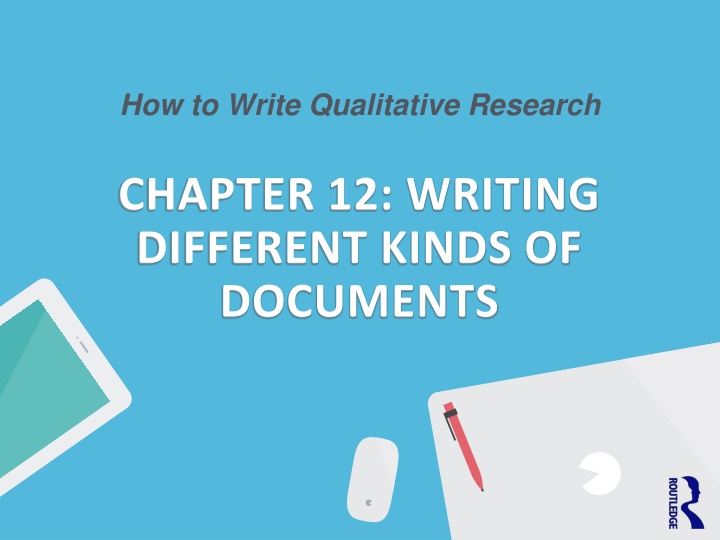
Crafting Effective Documents in Qualitative Research
Learn how to write different kinds of documents in qualitative research with successful examples as models. Understand key questions about your audience and what readers want to know, focusing on common document types such as course papers, dissertation or thesis proposals, grant and fellowship proposals, and theses and dissertations.
Download Presentation

Please find below an Image/Link to download the presentation.
The content on the website is provided AS IS for your information and personal use only. It may not be sold, licensed, or shared on other websites without obtaining consent from the author. If you encounter any issues during the download, it is possible that the publisher has removed the file from their server.
You are allowed to download the files provided on this website for personal or commercial use, subject to the condition that they are used lawfully. All files are the property of their respective owners.
The content on the website is provided AS IS for your information and personal use only. It may not be sold, licensed, or shared on other websites without obtaining consent from the author.
E N D
Presentation Transcript
How to Write Qualitative Research CHAPTER 12: WRITING DIFFERENT KINDS OF DOCUMENTS
Use successful examples as models. Weaver-Hightower, How to Write Qualitative Research
TWO KEY QUESTIONS Who is your audience, really? What do readers want to know? Weaver-Hightower, How to Write Qualitative Research
COMMON DOCUMENT TYPES Weaver-Hightower, How to Write Qualitative Research
COURSE PAPERS The Audience: Usually just the instructor(s) What the Audience Wants to Know Did you learn the course content? Can you write using disciplinary-specific norms? Weaver-Hightower, How to Write Qualitative Research
DISSERTATION OR THESIS PROPOSALS The Audience: An advisor and a small committee of professors What the Audience Wants to Know What will you research? Why is that important? How will you conduct the research? What addition will you make to knowledge? Do you have a plan to accomplish your goal? Weaver-Hightower, How to Write Qualitative Research
GRANT & FELLOWSHIP PROPOSALS The Audience: Depends on the grantor maybe one officer and/or maybe peer reviewers May be expert or generalist; may not know qualitative What the Audience Wants to Know Why do you need and deserve the money? Does the study have concrete value to the grantor and its stakeholders? Weaver-Hightower, How to Write Qualitative Research
THESES & DISSERTATIONS The Audience: An advisor and committee; sometimes external reviewers Scholars and students worldwide for decades to come What the Audience Wants to Know Differs by audience. Do you know how to conduct research? Can you write like a scholar? What did you find through the research? What are the implications and novel contributions? What can readers borrow or cite? Weaver-Hightower, How to Write Qualitative Research
JOURNAL ARTICLES The Audience: Peer reviewers and editors first assume they are picky!! The journal s readership What the Audience Wants to Know Is this good, quality science? What they list in the journal s author guidelines What research literature relates to your study? Enough about methods to check your design Do you have good data and interpret it well? What did you find through the research? What are the implications and novel contributions? Weaver-Hightower, How to Write Qualitative Research
MONOGRAPHS & TRADE BOOKS The Audience: For monographs, specialists in a field For trade books, a broad general audience What the Audience Wants to Know For monographs, nuance and detail and deep history For trade books, accessible content, with interest and style Weaver-Hightower, How to Write Qualitative Research
CONFERENCE PAPERS The Audience: Reviewers first may not be experts or know qualitative Attendees level of expertise depends on the conference What the Audience Wants to Know The complete argument, regardless of time or word restrictions Reviewers want savagely concise but patiently clear proposals with clear description of your study and its importance. Attendees want to hear things that help them with their own work, usually findings and discussion, but perhaps unique methods, too. Weaver-Hightower, How to Write Qualitative Research
ACTIVITY: INVESTIGATE THE PRACTICES OF JOURNALS YOU MIGHT PUBLISH IN Look up a journal that could potentially publish your work. Go to the journal s website and read all linked pages, especially any author or submission guidelines. Write down a list of expectations they have that may impact your writing. Skim the table of contents for each issue from the last five years. Do you see much qualitative work? Do you notice popular topics? Do any authors appear multiple times? Skim a few of the articles that pique your interest or relate to your topic. Do they have commonalities in structure, formatting, content, or style? Compare the journal you reviewed with those done by others. Weaver-Hightower, How to Write Qualitative Research
